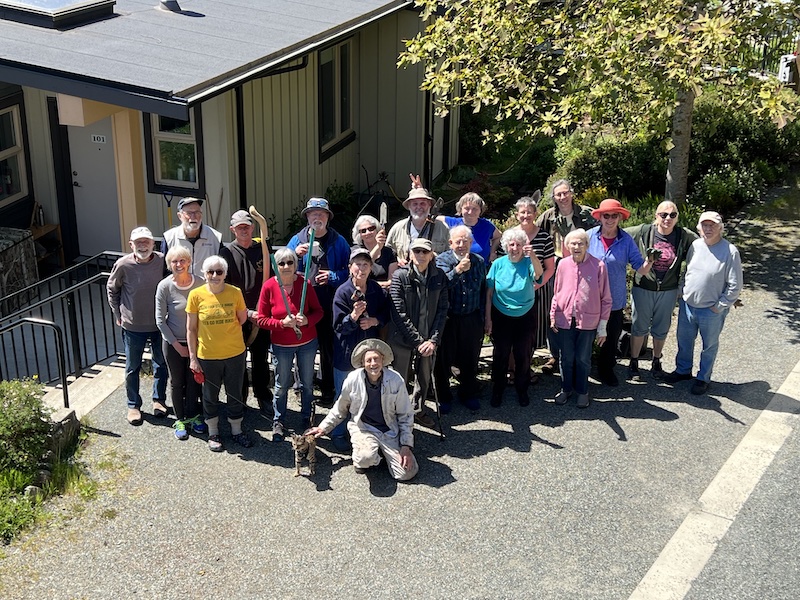
Email: seniorcohousing@gmail.com
Harbourside Virtual Tour Video
The Canadian Senior Cohousing Society (CSCS) was formed in 2011. The founders were a handful of volunteers committed to the model outlined in Charles Durrett’s Senior Cohousing Handbook. Registered in BC, the society’s scope was national. The aim was to provide mutual support to flourish, living in an optimal range of human functioning for the rest of our lives. Canadian Senior Cohousing combined the well-established international model of senior cohousing with new ideas for active aging here in Canada.
The social innovation that CSCS promoted was radical: to reframe societal expectations that aging means increasing passivity, social isolation, and dependency. Instead, CSCS envisioned an elderhood rich in social connection where Canadians could flourish through mutual support while reducing the burden on health care systems and families. CSCS brought an energy and urgency to this vision similar to the 1960’s reframing of what it meant to be young, no longer going passively from childhood to adulthood but celebrating a new age of adolescence. CSCS sought to transform the norm of going passively from adulthood to old age and celebrate a new age of flourishing as elders.
The society dissolved in 2022 after supporting two senior cohousing communities through move-in (Harbourside and West Wind Harbour).
CSCS moved some content from its former website (seniorcohousing.ca) to the Canadian Cohousing Network. The society’s accomplishments are listed here.
Although the society has dissolved, support for aging well in community continues. For information about available workshops, etc., please email: seniorcohousing@gmail.com
FAQ
What is senior cohousing?
Senior cohousing focuses on active aging in community. These communities prioritize aging well, i.e., they include amenities such as enhanced accessibility and a suite for a caregiver. However, so far, no cohousing communities in Canada are age restricted, as they value residents of all ages.
Founding owners work with professionals to develop the community, as in any cohousing development process. In senior cohousing, the design values physical accessibility for the units, as well as common spaces for caregiving and age-friendly activities. Neighbourly mutual support (co-care) is a voluntary and important product of social connection in senior cohousing.
What are the benefits of senior cohousing?
In senior cohousing, as Charles Durrett, one of the founders of cohousing in the US, says, “you can flourish for the rest of your life if you’re lucky, or at least for about ten years longer than if you live in a conventional, single family home.” You can reduce your environmental footprint while improving your quality of life. You can give and receive mutual support to foster interdependence as you age. You can benefit from social interaction that keeps your brain lively and your spirit nourished. And you can experience new opportunities for growth amidst the give and take of community living.
Where does senior cohousing come from?
Multigenerational cohousing in Denmark inspired senior cohousing. The Danish government supported this “Second Half of Life” housing as an effective strategy for healthy, active aging in place.
How did North Americans learn about senior cohousing?
Charles Durrett brought senior cohousing to North America in 2009 with the publication of his Senior Cohousing Handbook. Durrett and his partner, Kathryn McCamant, had adapted the European model of multigenerational cohousing and introduced it to American audiences back in the ‘80s through their book Cohousing: a Contemporary approach to housing ourselves (1988).
Where are senior cohousing communities located in the US and Canada?
Senior cohousing communities are becoming popular in the US – visit www.cohousing.org/senior-cohousing. The first senior cohousing in Canada, Wolf Willow Cohousing opened in Saskatoon in 2012. Harbourside Cohousing opened in 2016, followed by West Wind Harbour in 2021. Both are senior focused but not age-restricted, and both are in Sooke, BC. For information about other senior cohousing communities, please refer to our Detailed Community Info page.
How old do you have to be for senior cohousing?
So far, no Canadian senior cohousing communities have an age restriction. They welcome anyone who supports their vision and process. In some cohousing communities, especially in the US, one household member must be 55+.
What is a study group or course on Active Aging and why would some want to take it?
Even those with no desire to live in senior cohousing may find participation in a course or study group beneficial in planning their own aging strategies. Sure everyone thinks that aging happens to other people but if you are lucky you’ll get old too! It is not so hard to get out of denial about growing old in the company of like-minded people. Harbourside in Sooke, BC, required members to take a short course on aging well in community adapted from Durrett’s Study Group 1. West Wind Harbour and Ravens Crossing required a weekend workshop, “Is Cohousing for You?” Other communities have recommended but not required workshops/study groups.
Can I have a pet in senior cohousing?
Each community creates its own pet policy. Many communities do allow pets.
How do the features of cohousing benefit seniors?
Opportunities for participation and resident management engage seniors in any cohousing community. Seniors tend to make full use of common facilities. They have time for meaningful contributions, neighbourly connections, and fun!
What is Co-care?
Co-care is a grassroots model of neighbourly mutual support that can help reduce social isolation and promote positive, active aging. It encourages independence through awareness that we are all interdependent. In a cohousing community, giving and receiving co-care is entirely voluntary. We may choose to support each other through activities such as running errands, driving, cooking, or going for a walk with our neighbours. Co-care can provide short-term support for cohousing residents recovering from surgery. We believe that being good neighbours helps us age well in community and have fun doing it.
Is senior cohousing affordable and sustainable?
Senior cohousing provides housing that is more financially, socially, and environmentally affordable and sustainable than many other options for seniors